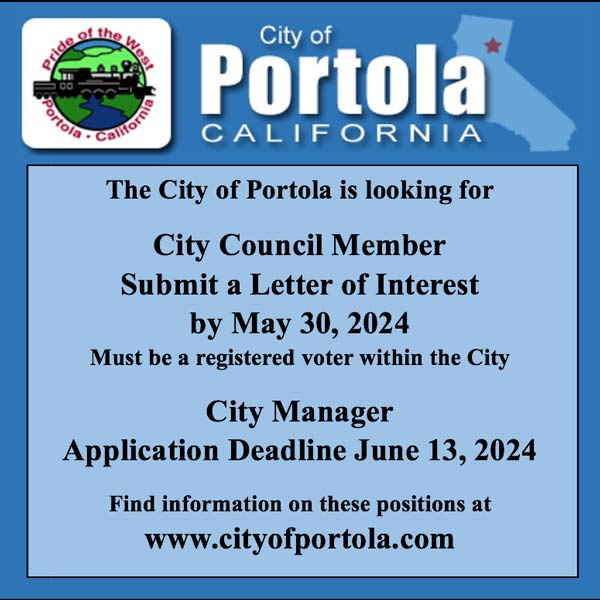For the first time in nearly eight years, Quincy residents again have an option for buy-back recycling close to home. The Nieman family — Curt, Lisa and daughter Brittney — have opened Quincy Recycler at 435 N Mill Creek Road across from Trilogy Lane.
Curt said the opportunity to open a recycling center in Quincy arose with the closure of Daw’s Recycling Center in Portola. The Niemans opened Quincy Recycler on October 4, 2023, and have been steadily adding equipment and infrastructure.
The center is open from 10:30 a.m. to 4:30 p.m. Monday through Friday, closed from noon to 12:30 for lunch. It is open 10:30 a.m. to 1:30 p.m. Saturdays, and closed Sundays. More information is available via Facebook or by calling 530-283-3301.

After the Neimans collect and, in some cases, condense material into bags or bales, Curt transports it to the Sacramento area for sale to processors. A full trailer load of cans weighs in at 8,000 pounds, he said.


Quincy Recycler pays California refund value for marked beverage containers made of aluminum, glass, plastic and bimetal. To determine whether a container is eligible for CRV, customers should look for the following phrases, which state law requires to be “clearly and prominently” included on containers:
- California redemption value.
- CA redemption value.
- California cash refund.
- CA cash refund.
- CA CRV.
Brittney shared examples of eligible CRV containers accepted at the site:
- Glass: beer and malt beverage bottles.
- Aluminum: beer and soda cans.
- #1 PET plastic: water bottles.
- #2 HDPE (high-density polypropylene) plastic: SunnyD bottles.
- #5 PP (polypropylene) plastic: Pedialyte bottles.
- #7 “other” plastic: 1-gallon Arizona iced tea bottles.
- Bimetal: coconut water and pineapple juice cans.
Customers should remove all caps before arrival at the site, where they have the option to be paid for CRV materials by weight or by count, up to 50 items per type — aluminum, glass and plastic — per day. A refund will not be paid for non-CRV items or for items contaminated by dirt or moisture.
Several new containers were added to the CRV program Jan. 1. Customers can now receive refunds on containers for wine and distilled spirits, and also for large vegetable juice and fruit juice containers. More details about these changes are available at https://calrecycle.ca.gov/bevcontainer/basics/.
The following are not eligible for CRV:
- Milk containers.
- Medical food containers.
- Infant formula cannisters.
- Food and non-beverage containers.
- Juice boxes.
- Juice pouches.
- Juice cartons.
How it works
CalRecycle is a state program that aims to protect the state’s environment and climate through reduction, reuse and recycling, among other efforts. The goal is to transition from a disposable economy to one that is fully circular.
CalRecycle manages the California Beverage Container Recycling Program, which provides a redeemable fee for certain containers. These fees help encourage Californians to recycle, bringing the state closer to its goal of an 80% recycling rate. The most recent overall rate, calculated in 2021, was 68% statewide.
When a consumer purchases a CRV-eligible container at a grocery store, the purchase price includes the CRV deposit. For all beverage containers smaller than 24 ounces, the deposit is 5 cents each. For all beverage containers 24 ounces or larger, the deposit is 10 cents each. For wine and distilled spirits in pouches or cartons, the deposit is 25 cents each.
That deposit is then forwarded through the retailers and distributors to CalRecycle, which pays processors. The processors purchase material from recyclers like the Niemans, who return the CRV deposit to customers who bring items in for buy-back recycling.

As an additional incentive for plastic recycling, state law requires that all CRV plastic beverage bottles contain postconsumer recycled content in the amount of 15% currently, rising to 50% by 2050.
Local recycling
Quincy and Chester residents may remember the RePlanet buy-back kiosks that operated in those areas until 2016. RePlanet closed all of its locations statewide in 2019. Currently there are only two buy-back options in Plumas County: Quincy Recycler and Feather River Disposal at 300 Greenville Dump Road in Greenville. Neither of these offer the “reverse vending machines” that were available in the RePlanet kiosks.
Drop-off recycling without CRV buy-back is available at the following Plumas County locations:
- Chester Transfer Station, 3 Chester Dump Road.
- Delleker Transfer Station, 73980 Industrial Way.
- East Quincy Recycling Center, 39 Abernathy Road.
- Graeagle Transfer Station, 920 Blairsden-Graeagle Road.
The Greenville Transfer Station also accepts non-CRV drop-off recycling.
Curt said he is already planning to erect a new building at the Quincy Recycler site, and he is investigating the possibilities of expanding to Chester and Portola. More local recycling options mean more options for Plumas County residents to reduce litter and waste — and more ways to recover their CRV deposit money.




